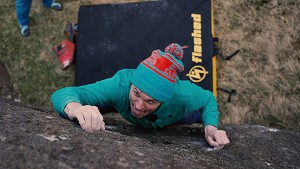
During a trip to Yosemite nearly fifteen years ago, after consistently lobbing from the crux of Midnight Lightning onto an old square of carpet, I decided to hobble away and buy one of these new bouldering crash pads that I had seen a few people carrying. My first purchase was a small Metolius crash pad. It looked huge compared to my square of carpet and felt like it cost the earth but I headed out of Neptune Mountaineering in Boulder confident to tackle more boulder problems. After years of abuse the foam in my first pad 'died'. Metolius have remained at the cutting edge of pad design and innovation - to an extent leading the way in the development of quality equipment for a facet of the sport that has exploded in popularity over the last twenty years - so I decided to test their Boss Hogg Crash Pad.
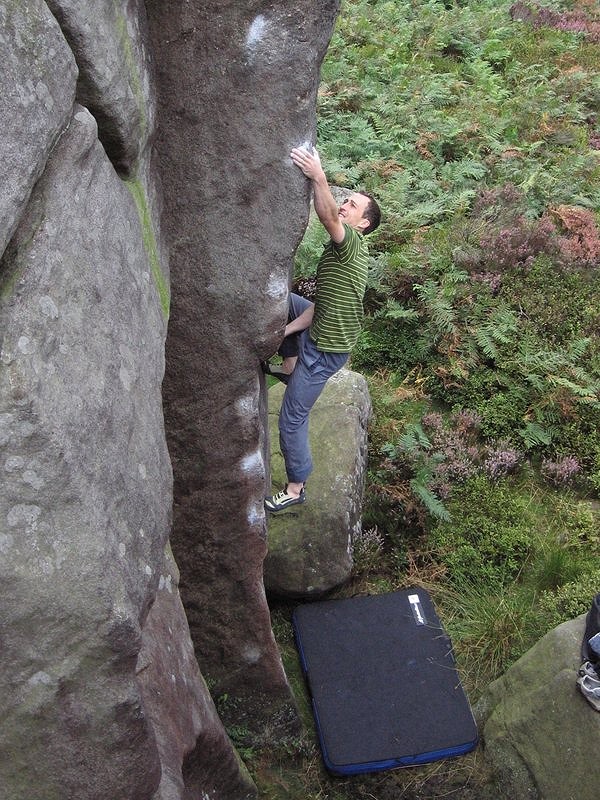
The Boss Hogg Crash Pad weighs 4.92kg and sits in the medium/large section of the Metolius range - between the Stomp and the Colossus Crash Pads. Open it measures 91.4 cm x 121.9 cm x 10.2 cm; folded 91.4 cm x 66.0 cm x 20.3 cm. The pad benefits from what Metolius state is an 'innovative new foam layering system which provides the ultimate in fall-stopping potential'. In effect this is a top sheet of one inch closed-cell foam, which is unsplit. Under this sits a 2.5 inch open-cell and half inch closed-cell bottom layer with an angled hinge design.
"Being a little shorter but wider than average the pad sits higher on your back when carrying it as a rucksack and, as a result, feels easier to manoeuvre/more balanced when you've got other gear stuffed inside..." |
When folded away the mat's notable features are 'Hypalon' reinforced corners, a single-buckle closure-flap with stash pocket and a durable outer cover. Inside, the pad has a carpet top with waterproof backing in order to keep moisture out of the foam. The flap closure with aluminium buckles (guaranteed for life!) keeps the pad together and, along with padded shoulder straps, waist belt and suitcase style carry handle/two drag handles, the pad is ready for sustained use.
Like its namesake, the 'Boss Hogg' is a 'chunky' piece of equipment but the landing area is a good size and the depth of padding is excellent. Being a little shorter but wider than average the pad sits higher on your back when carrying it as a rucksack and, as a result, feels easier to manoeuvre/more balanced when you've got other gear stuffed inside. The padded shoulder straps are well thought out - I did wonder if these would simply turn into mobile sponges making the pad unpleasant to carry, but as yet this has not been the case. I did however feel that the waist belt (with plastic buckles) was unnecessary for this size of pad and was a hindrance, getting trapped between rocks. The waist belt can be removed and I did so on its second outing.
Metolius Boss Hogg Crash Pad
- Weight 4.92kg
- Top sheet 1 inch closed-cell foam is unsplit (no gutter)
- 2.5 inch open-cell and 0.5 inch closed-cell bottom layer has Metolius angled hinge design
- Hypalon reinforced corners and hinge, single-buckle closure-flap and handy stash pocket
- Ultra-durable ballistics cover
- Auto carpet top with waterproof backing keeps shoes clean while keeping moisture out of foam
- Unbreakable aluminum buckles
- Flap closure with innovative speed-hook buckle
- Padded shoulder straps
- Waist belt
- Suitcase-style, molded carry handle and two drag handles
- Open size: 91.4 cm x 121.9 cm x 10.2 cm
- Folded size: 91.4 cm x 66.0 cm x 20.3 cm
The rounded, reinforced corners are bombproof and will definitely increase the life span of the pad. The no-nonsense, single buckle closure eliminates the need for any other buckles and straps. It does, however, have a little too much Velcro on the internal part of the flap. It's unnecessary as the cut of the fabric on the flap closure holds the pad in place - the Velcro only serves to collect various botanical samples such as leaves and mud!
The carpet top on the internal part of the pad is a useful addition and one that has been successful with other manufacturers, but the felt-esque choice of fabric seems more suited to the dry granite of California than the wet mud of the Peak or Yorkshire.
In short
The Metolius Boss Hogg is an excellent crash pad and well worth a purchase - the £175 price tag does feel a little steep but it appears competitive in comparison with other makes of similar size pads. The only slight concerns were the needless amounts of Velcro on the closure flap and the rather unnecessary waist belt, but the size, durability and shock absorbency of the pad far outweigh these. Well done Metolius, another quality product.
PRICE: £175
MORE INFO: on the Metolius Website.
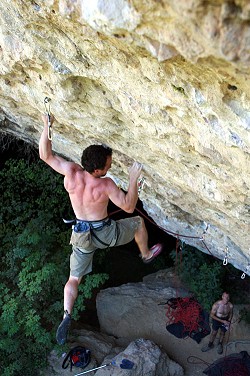
About Mark Katz
Mark Katz relocated to Yorkshire after ticking most of the hard boulder problems in North Wales. Not solely a boulderer however, Katz made several hard first ascents in Wales around ten years ago, such as Harmartia (E8 6c) in Ogwen valley and Agua Caliente (E7/8) in the Llanberis Pass.
Katz is currently chowing his way through the gritstone bouldering testpieces of Yorkshire, which he has just about demolished. He has also added several first ascents to the area including the ludicrously difficult Twelve Bore (V12) at Earl Crag, which he climbed in 2006.

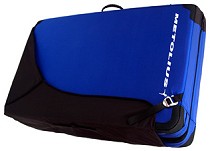

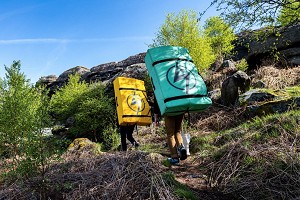
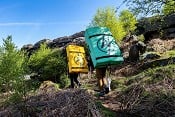


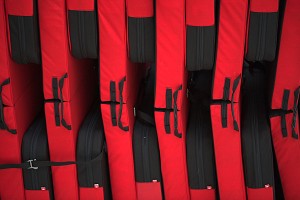
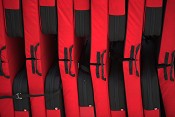
Comments